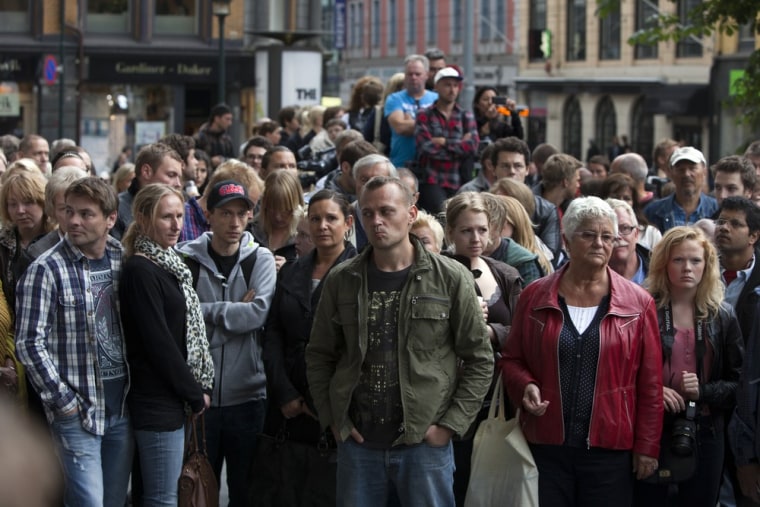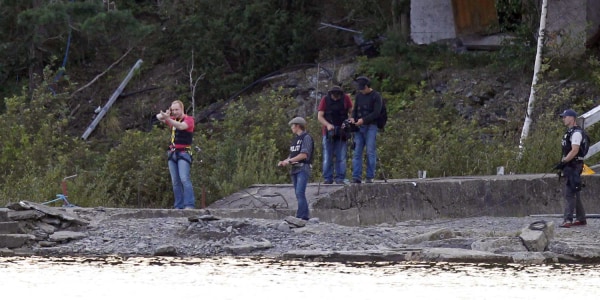Norway's police believe Anders Behring Breivik probably acted alone in killing 76 people last Friday, as Norwegians united in revulsion against the worst attack in the Nordic nation since World War II.
Breivik, who admitted to carrying out a bomb attack and shooting spree Friday, told a court on Monday that two cells of collaborators were in his "Knights Templar" group that aimed to "save" Europe from Muslims.
Police attorney Christian Hatlo told reporters on Monday he "cannot completely, and I stress completely, rule out that others were involved in what happened."
But police say privately that they think more cells are unlikely although security services are checking with their international partners about potential foreign links.
"We feel that the accused has fairly low credibility when it comes to this claim but none of us dare to be completely dismissive about it either," a source close to the investigation told Reuters.
Police are checking Breivik's phone and credit card records as well as his known movements to determine whether he was working alone.
Researchers also doubt Breivik's claim that he is part of a wider far-right network of anti-Islam "crusaders," seeing them as empty bragging by a psychopathic fantasist who has written that exaggeration is a way to sow confusion among investigators.
Magnus Ranstorp, Research Director at the Center for Asymmetric Threat Studies at the Swedish National Defense College, said, as far as he knows, nobody had evidence of the existence of the Knights Templar organization.
"There's no one who seems to know if the group exist or if it's something he made up," he told Reuters. "They (mass killers) are usually alone. He's extremely narcissistic and he goes on about himself and his role in history."
Ragnhild Bjoernebekk, a researcher at Norway's police school who specializes in crime and violence, said it's not inconceivable that Breivik was part of a network, but added: "The fact he wants to talk about it is surprising. Perhaps he wants to suggest that he is part of something bigger than himself," she said.
Further undermining his claim, Breivik's manifesto published before his shooting rampage suggested authorities should be disinformed about collaborators.
"Give the impression that your cell is larger by attempting to forward misinformation on the police band or by other means," he said in the 1,500 page document.
In the rambling manifesto, which mixes imagery of medieval crusades and Internet war games, Breivik calls himself a "Justiciar Knight Commander of Cell 8" and said he would try to "initiate contact with cell 8b and 8c."
The document says each cell commander has up to two operatives.
"Intuitively, it feels like he is alone when you read the document. It's like he's lost in this made up world and can't distinguish between fantasy and reality," said Ranstorp.
'Essential' for 'normal life' to continue Earlier Monday, Norway police lowered the number of deaths in Friday's bombing in Oslo and the mass shooting at a youth camp to 76, down nearly 20 from previously reported numbers, citing difficulties in gathering information at Utoya island where the shooting spree occurred.
There were 68 killed at the camp site run by the Labor Party, significantly lower than the 86 previously reported, and eight killed in the bombings, an increase of one, police said.
"We had to prioritize the survivors and make the area safe and we came out with a too high number of dead," police spokesman Oystein Maeland said at a press conference on Monday afternoon. "The main thing for us was to convey the information that the number [of dead] was much higher than the 10 we had reported earlier."
"Now it's essential that normal life continues," said another police spokesman.
Police also responded to criticism that their response time was too slow, saying that they "only have one helicopter with limited air time, it’s not a tool we can use all the time and it wouldn't have made any difference to these events," a spokesman said. "A better response time than that cannot be expected."
Slideshow 57 photos
Norway in mourning after massacre
It took police a full hour to get a team of elite forces to the island. Norwegian television chartered a helicopter and filmed the killer before the police showed up. When the armed team did arrive, Breivik gave himself up without a fight. On Tuesday, Justice Minister Knut Storberget will meet police chiefs who are facing criticism.
The prosecutor said Monday that Breivik appeared "unaffected" by his actions and was prepared to spend the rest of his life in prison. Breivik said through his lawyer that he wanted to explain his motives at the hearing, but a judge ruled the hearing would be closed to the public and press.
After the hearing, the judge said he had ordered Breivik detained in solitary confinement for eight weeks, with no letters, newspapers or visits, except from a lawyer. The detention, in line with a request from prosecutors, will allow them to investigate the case against Breivik.
Thousands rally in Oslo Also on Monday, at least 100,000 people rallied in Oslo and tens of thousands more marched in cities across Norway in a nationwide expression of grief and unity over the massacre.
Norwegian PM Jens Stoltenberg addressed the evening crowd, many of them holding up red and white roses for remembrance, his voice trembling with emotion: "By taking part you are saying a resounding 'yes' to democracy."
He called the Rose March a "march for democracy, a march for tolerance, a march for unity."
In a country of 4.8 million, where a single murder makes front-page news, the solidarity rally was probably the biggest since World War II.
Earlier in the day, a handful of enraged protesters awaited Breivik at Oslo District Court.
"Get out, get out!" shouted Alexander Roeine, 24, banging on a car he wrongly believed contained the mass killer. In fact police brought Breivik into the courthouse via a side entrance.
"Everyone here wants him dead," Roeine said, adding that he knew one of the dead and three survivors of the attacks.
Police defended themselves from suggestions that some alarm bells should have rung about Breivik. The head of the PST security police even said he would have slipped through the net in former East Germany with its feared Stasi police.
PST says Breivik's name appeared only once, on a list of 50-60 Norwegians sent by Interpol after he paid 120 crowns ($22.16) to a Polish company that sold chemicals and was on a watch list. They found no reason to react.
The maximum jail term in Norway is 21 years, although that can be extended if there is a risk of repeat offenses. Breivik is likely to face a lifetime in jail if convicted of the crimes.
Meanwhile, in France police searched Breivik's father's house, Britain's Press Association reported. Breivik and his father, a former Norwegian diplomat who is said to be devastated by the news of his son's involvement, haven't spoken in many years, according to media reports.
"In my darkest moments, I think that rather than killing all those people, he should have taken his own life," Breivik's father told Norwegian independent TV2 in France.
He said his son, with whom he has had no contact since he was a teenager, must be mentally ill. "There is no other way to explain it."
Photoblog: Norway mourns after shooting spree, bombing
Breivik asked to wear a uniform in court, but was denied the request by the judge. His lawyer, Geir Lippestad, said he did not know what type of uniform he wanted to don. Breivik has not served in the armed forces but in some of the pictures he posted on the Internet before his killing spree he was dressed in a military-style outfit. The killer was dressed as a policeman during his shooting spree.
Lippestad said his client had admitted to Friday's attacks but that he denies any criminal guilt.

The worst peacetime massacre in the normally placid country's modern history appears to have been driven by Breivik's mission to save Europe from what he sees as the threats of Islam, immigration and multiculturalism.
Norway mourns
Crowds packed Oslo cathedral square for a minute of silence at midday on Monday that swelled into five. The only sounds were the beeping of traffic crossings, the crying of seagulls and a dog barking.
"This is a tragic event to see all these young people dying due to one man's craziness," Sven-Erik Fredheim, 36, a mechanic, told Reuters near the cathedral square where people piled more flowers onto a carpet of bouquets already laid there for the dead since Friday's violence.
Survivors offered harrowing accounts of the shooting. Ingvild Stensrud, 16, hid in a house on the island with friends only to find the shooter in their midst.
"It's horrible my friends were killed and I was shot because I believe in a multicultural Norway," she said.
Immigration debate
The attack was likely to tone down the immigration debate ahead of September local elections, analysts said, as parties try to distance themselves from Breivik's beliefs and reinforce Norwegians' self-image as an open, peaceful people.
Norway's immigrant numbers nearly tripled between 1995 and 2010 to almost half a million in a population of 4.8 million.
The sense that many were drawn by Norway's generous welfare handouts helped spur the growth of the Progress Party which became Norway's second biggest in parliament after the 2009 election on a largely anti-immigration platform.
Breivik was once a member of the party, but left complaining it was too politically correct. It was then he began scheming to "resist", burying ammunition more than a year ago, weight-lifting, storing up credit cards and researching bomb-making while playing online war games.
